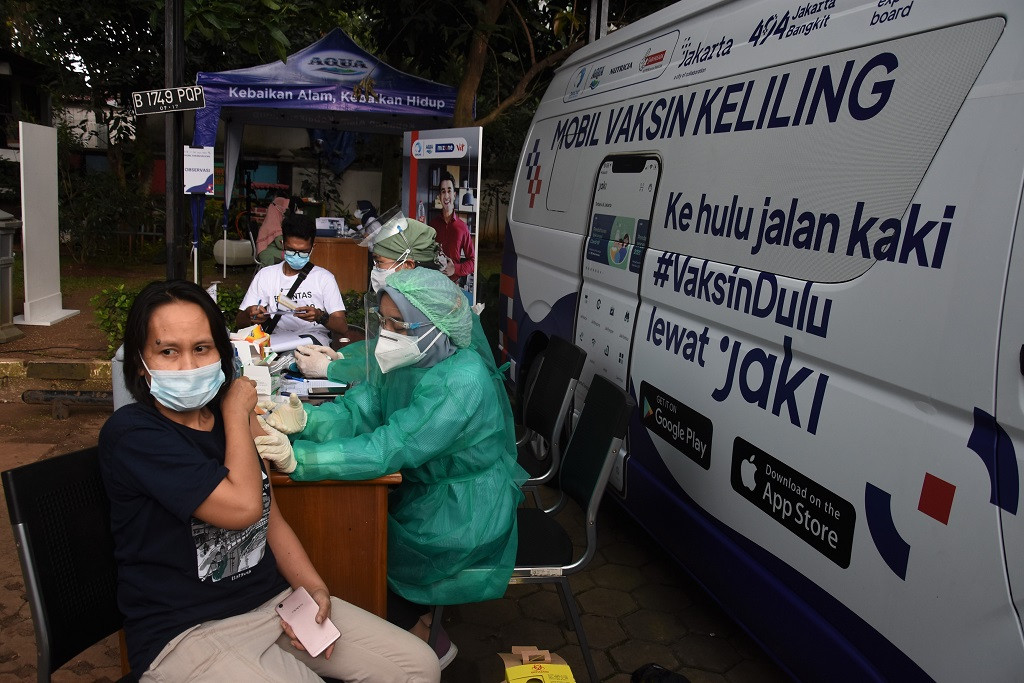Popular Reads
Top Results
Can't find what you're looking for?
View all search resultsPopular Reads
Top Results
Can't find what you're looking for?
View all search resultsASEAN is collapsing in face of COVID-19
Scientific decisions must be made quickly and systematically to protect citizens and workers before the Delta variant gains a toehold as the dominant virus.
Change text size
Gift Premium Articles
to Anyone
Prior to the pandemic in December 2019, ASEAN had set a good example to the rest of East Asia on how to avoid interstate conflicts.
In 1979-2020, the fatalities of armed forces and civilians in interstate conflicts in the region dropped by an unprecedented 97 percent as denoted by the "East Asian Peace" team project, in the Nordic Institute of Peace Studies in Copenhagen, Denmark.
Since the declaration of the pandemic on March 18 2020, however, with the exception of Singapore, which quickly set the highest target of reaching 100 percent vaccinations, almost all the member states of ASEAN have been reeling.
At this rate, Indonesia will be the chair of a failed ASEAN while also hosting the Group of 20 in 2022.
The fact is that this pandemic had many warning signs, it was not what one calls "a black swan event".
Over the last 50 years, zoonotic diseases with human-to-human transmission have been well-documented.
Yet, in spite of this the member states of ASEAN adopted an apathetic and lackadaisical attitude toward prior warnings, such as by this author and Laurie Garrett at the Council for Foreign Relations.
Rather ASEAN rejoiced in preventing the “traditional” threat of large inter-state conflicts and lost total sight of other imminent dangers in the form of non-traditional threats; of which SARS-Cov-2 is clearly one.
That said, the Defense Ministry in Malaysia still lists COVID-19 as a "traditional threat."
Other member states in ASEAN may not have followed the Malaysia template, especially Cambodia, Myanmar, Laos and Vietnam, but, regardless of the taxonomy of threat, ASEAN is failing.
On zoonotic diseases and human-to-human transmission, ASEAN cannot claim sheer ignorance. It is worth listing these: Nipah Virus, 1999-ongoing; Severe Acute Respiratory Syndrome (SARS), 2002-2003; H5N1 Bird Flu, 2005; H1N1 Swine Flu, 2008-2009; Middle Eastern Respiratory Syndrome Coronavirus (MERS-Cov), 2012-ongoing; and Rabies, 2014-ongoing.
Given the number of COVID-19 infections, which are now rising rapidly in the region, with the specter of "long haulers," and "long COVID" looming large, it is high time to use high quality vaccines manufactured based on mRNA technology to give ASEAN a fighting chance.
If not, some segments of the 670 million population in Southeast Asia may yet become vulnerable, permanently.
With the proliferation of the Delta variant, which can even escape the antibodies generated by the immune system after two doses of vaccination, Indonesia risks becoming the host of G20 next year at a time when ASEAN is flailing
However, if the Pfizer, Moderna and the soon to be introduced Novavax vaccines are deployed, the risk of infection is within a narrow band of 4-5 percent only as the vaccines’ efficacy are within the range of 95-96 percent.
Southeast Asia is an important sub-regional system of the Indo-Asia-Pacific that cannot be allowed to flounder.
It oversees the Malacca Strait, which allows vessels of all sizes to transport important cargoes to enter the heavily contested South China Sea. Indonesia, Singapore and Malaysia are three of the most littoral states.
Yet, all three and ASEAN are facing the world's most lethal pathogen since the deadly Spanish Influenza (1919-1920). The latter is estimated to have killed between 50 million and 100 million people worldwide.
If further mismanagement persists, there is no telling whether ASEAN can avoid such a tragic fate. The truth is without a systematic regionwide vaccination program, ASEAN is staring at an abyss, and could well fall into it forever.
This is made all the more serious if the vaccination rollout is still mixed with the questionable Sinovac; not the more reliable Sinopharm.
Doctors and nurses vaccinated with Sinovac in Indonesia and Thailand have been infected with SARS-Cov-2 lately, despite having received double dosages.
The Health Ministry in Singapore does not encourage anyone to vaccinate with Sinovac because of a lack of clinical data.
In Taiwan, wary of any sudden stoppage caused by an outbreak of COVID-19, which could disrupt the supply chain of the world's foremost semiconductor producers, Foxconn and TSMC struck a US$350 million deal on July 14 to immunize their workers with Pfizer even though the factories are in Guangzhou, in mainland China.
This is what ASEAN should be doing too. Immunizing its people immediately with Pfizer or Moderna, even AstraZeneca, which the European Medical Commission (EMC) has concluded offer "more benefits than risks."
Scientific decisions must be made quickly and systematically to protect citizens and workers before the Delta variant gains a toehold as the dominant virus.
The response must be based on four “Vs”, which are increasing the velocity of immunizing people quickly with reliable vaccines; shortening the time for validating COVID-19 results in mass testing; verifying these results with a second but consequential final test and finally validating post recovery patients. This is the gold standard of warding off the Delta variant.
If one were to look at the COVID-19 Recovery Index from Nikkei Asia, listed on July 7, the rankings for ASEAN are atrocious. Except Singapore, which is in the top five, most of the rest of the ASEAN member states are outside the top 100. Brunei and Myanmar provide no data. They are as follows: Singapore, fifth place, Laos (94), the Philippines (101), Cambodia (105), Indonesia (110), Malaysia (114), Vietnam (114) and Thailand (119).
If the Delta variant is stalking ASEAN, the latter must enlist the help of the Red Cross and Medecins San Frontieres for further help, as the situation has become a complex humanitarian emergency that even the ASEAN COVID-19 Response Fund cannot handle.
***
Phar Kim Beng is founder CEO and Osman Erdoğdu is chief knowledge officer of Strategic Pan Indo-Pacific Arena (strategicpipa.com).










